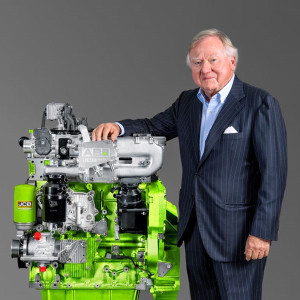JCB’s hydrogen engine cleared for commercial use


A hydrogen combustion engine developed by JCB has been cleared by licensing authorities in Europe for commercial use. The construction equipment company is the first to develop a fully working combustion engine fuelled by hydrogen. JCB confirmed that 11 licensing authorities gave permission for the hydrogen engine, which has been developed over the last three years at the cost of GBP100 million, to be sold across Europe.
The Netherlands' Vehicle Authority RDW was the first to issue official certification, and others including Great Britain, Northern Ireland, Germany, France, Spain, Belgium, Poland, Finland, Switzerland and Lichtenstein, followed suit. JCB has already produced more than 130 evaluation engines which are powering construction machinery including backhoe loaders, Loadall telescopic handlers and generator sets. JCB chairman Lord Bamford said the certification being in place in so many European countries "bodes very well" for the future of hydrogen combustion technology.
"JCB has proved in recent years that it is a proper zero emissions solution for construction and agricultural equipment. This formal type approval/certification paves the way for the sale and use of hydrogen engines right across the UK and Europe."
How viable are hydrogen-powered vehicles?
In April 2024, the UK government set regulations granting further permission for companies to test hydrogen-powered vehicles, such as diggers, on the UK's roads. Technology and Decarbonisation minister at the time, Anthony Browne, said: "Allowing hydrogen-powered tractors, diggers and forklifts to use our roads is a common-sense move to help reduce emissions[1]."
In September last year, car manufacturers BMW and Toyota joined forces to develop hydrogen fuel cell technologies[2], with BMW announcing that it will launch its first hydrogen-powered series of vehicles to the public in 2028, which it noted will complement rather than replace its range of battery electric vehicles. A hydrogen fuel cell vehicle is powered in a way comparable to EVs, using hydrogen gas to trigger an electrochemical reaction which generates a current, charges the battery and powers an electric motor. Unlike lithium-ion EVs, they still have an exhaust, but the only waste product produced from the reaction is pure H2O.
The difference with JCB's hydrogen engines is that hydrogen combustion engines work like their petrol-fuelled counterparts, filled with hydrogen gas which turns the engine and delivers power to the wheels. Although a hydrogen combustion engine does not produce carbon emissions, it does produce equally undesirable nitrogen oxides. The process of extracting, producing, and transporting raw hydrogen is also, currently, immensely carbon-intenstive.
At this early stage[3], the use case for green hydrogen in aviation has been shown, with the successful trial of hydrogen refuelling by easyJet, carried out at Bristol Airport.
Dubbed Project Acorn, the information and insights collected will be used for research by groups like Hydrogen in Aviation (HIA) to ensure that the UK's infrastructure, regulations, and policies keep up with the technological advancements in carbon-emission-free flying.
References
- ^ a common-sense move to help reduce emissions (www.current-news.co.uk)
- ^ BMW and Toyota joined forces to develop hydrogen fuel cell technologies (www.current-news.co.uk)
- ^ this early stage (www.current-news.co.uk)